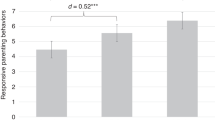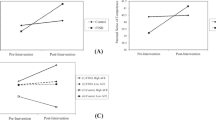Abstract
We sought to determine impacts of a pediatric primary care intervention, the Video Interaction Project, on 3-year trajectories of parenting stress related to parent–child interactions in low socioeconomic status families. A randomized controlled trial was conducted, with random assignment to one of two interventions Video Interaction Project (VIP); Building Blocks or control. As part of VIP, dyads attended one-on-one sessions with an interventionist who facilitated interactions in play and shared reading through review of videotaped parent–child interactions made on primary care visit days; learning materials and parenting pamphlets were also provided to facilitate parent–child interactions at home. Parenting stress related to parent–child interactions was assessed for VIP and Control groups at 6, 14, 24, and 36 months using the Parent–Child Dysfunctional Interaction subscale of the Parenting Stress Index—Short Form, with 378 dyads (84 %) assessed at least once. Group differences emerged at 6 months with VIP associated with lower parenting stress at three of four ages considered cross-sectionally and an 17.7 % reduction in parenting stress overall during the study period based on multi-level modeling. No age by group interaction was observed, indicating persistence of early VIP impacts. Results indicated that VIP, a preventive intervention targeting parent–child interactions, is associated with decreased parenting stress. Results therefore support the expansion of pediatric interventions such as VIP as part of a broad public health strategy to address poverty-related disparities in school-readiness.

Similar content being viewed by others
References
Abidin, R. R. (1997). The parenting stress index: A measure of the parent–child system. In C. P. Zalaquett & R. J. Woods (Eds.), Evaluating stress. Lathan, MD: University Press of America.
Anthony, L. G., Anthony, B. J., Glanville, D. N., Naiman, D. Q., Waanders, C., & Shaffer, S. (2005). The relationships between parenting stress, parenting behaviour and preschoolers’ social competence and behaviour problems in the classroom. Infant and Child Development, 14, 133–154.
Armstrong, K. L., Fraser, J. A., Dadds, M. R., & Morris, J. (1999). A randomized, controlled trial of nurse home visiting to vulnerable families with newborns. Journal of Paediatrics and Child Health, 35(3), 237–44. Retrieved from http://www.ncbi.nlm.nih.gov/pubmed/10404442.
Bigelow, A. E., MacLean, K., Proctor, J., Myatt, T., Gillis, R., & Power, M. (2010). Maternal sensitivity throughout infancy: Continuity and relation to attachment security. Infant behavior and Development, 33(1), 50–60.
Cates, C. B., Dreyer, B. P., Berkule, S. B., White, L. J., Arevalo, J. A., & Mendelsohn, A. L. (2012). Infant communication and subsequent language development in children from low-income families: The role of early cognitive stimulation. Journal of Developmental and Behavioral Pediatrics, 33(7), 577–585.
Chau, I. Y., & Landreth, G. L. (1997). Filial therapy with Chinese parents: Effects on parental empathic interactions, parental acceptance of child and parental stress. International Journal of Play Therapy, 6(2), 75–92.
Cohen, N. J., Lojkasek, M., Muir, E., Muir, R., & Parker, C. J. (2002). Six-month follow-up of two mother-infant psychotherapies: Convergence of therapeutic outcomes. Infant Mental Health Journal, 23(4), 361–380.
Crnic, K. A., & Booth, C. L. (1991). Mothers’ and fathers’ perceptions of daily hassles of parenting across early childhood. Journal of Marriage and Family, 53(4), 1042–1050.
Crnic, K. A., Gaze, C., & Hoffman, C. (2005). Cumulative parenting stress across the preschool period : Relations to maternal parenting and child behaviour at age 5. Infant and Child Development, 14, 117–132.
Deater-Deckard, K. (2004). Parenting stress. New Haven : Yale University Press.
Garner, A. S., & Shonkoff, J. P. (2012). Early childhood adversity, toxic stress, and the role of the pediatrician: Translating developmental science into lifelong health. Pediatrics, 129, e224–e231.
Gross, D., Fogg, L., & Tucker, S. (1995). The efficacy of parent training for promoting positive parent-toddler relationships. Research in Nursing and Health, 18(6), 489–499.
Hart, B., & Risley, T. R. (1995). Meaningful differences in the everyday experience of young American children. Baltimore: Paul H Brookes Publishing.
Huebner, C. E. (2000). Promoting toddlers’ language development through community-based intervention. Journal of Applied Developmental Psychology, 21(5), 513–535.
Jarvis, P. A., & Creasey, G. L. (1991). Parental stress, coping, and attachment in families with an 18-month-old infant. Infant Behavior and Development, 14(4), 383–395.
Kaaresen, P. I., Rønning, J. A., Ulvund, S. E., & Dahl, L. B. (2006). A randomized, controlled trial of the effectiveness of an early-intervention program in reducing parenting stress after preterm birth. Pediatrics, 118(1), e9–e19.
Karrass, J., VanDeventer, M. C., & Braungart-Rieker, J. M. (2003). Predicting shared parent-child book reading in infancy. Journal of Family Psychology, 17(1), 134–146.
Klass, P., Dreyer, B. P., & Mendelsohn, A. L. (2009). Reach out and read: Literacy promotion in pediatric primary care. Advances in Pediatrics, 56, 11–27.
Knudsen, E. I., Heckman, J. J., Cameron, J. L., & Shonkoff, J. P. (2006). Economic, neurobiological, and behavioral perspectives on building America’s future workforce. PNAS, 103(27), 10155–10162.
Landry, S. H., Smith, K. E., & Swank, P. R. (2006). Responsive parenting: Establishing early foundations for social, communication, and independent problem-solving skills. Developmental Psychology, 42(4), 627–642.
Luborsky, L., Mclellan, A. T., George, E., O’Brien, C. P., & Auerbach, A. (1985). Therapist success and its determinants. Archives of General Psychiatry, 42, 602–611.
Mendelsohn, A. L., Dreyer, B. P., Brockmeyer, C. A., Berkule-Silberman, S. B., Huberman, H. S., & Tomopoulos, S. (2011a). Randomized controlled trial of primary care pediatric parenting programs: Effect on reduced media exposure in infants, mediated through enhanced parent–child interaction. Archives of Pediatrics and Adolescent Medicine, 165(1), 42–48.
Mendelsohn, A. L., Dreyer, B. P., Flynn, V., Tomopoulos, S., Rovira, I., Tineo, W., & Nixon, A. F. (2005). Use of videotaped interactions during pediatric well-child care to promote child development: A randomized, controlled trial. Journal of Developmental and Behavioral Pediatrics, 26(1), 34–41.
Mendelsohn, A. L., Huberman, H. S., Berkule, S. B., Brockmeyer, C. A., Morrow, L. M., & Dreyer, B. P. (2011b). Primary care strategies for promoting parent–child interactions and school readiness in at-risk families: The bellevue project for early language, literacy, and education success. Archives of Pediatrics and Adolescent Medicine, 165(1), 33–41.
Mendelsohn, A. L., Valdez, P. T., Flynn, V., Foley, G. M., Berkule, S. B., Tomopoulos, S., & Dreyer, B. P. (2007). Use of videotaped interactions during pediatric well-child care: Impact at 33 months on parenting and on child development. Journal of Developmental and Behavioral Pediatrics, 28(3), 206–212.
Mulsow, M., Caldera, Y. M., Pursley, M., Reifman, A., & Huston, A. C. (2002). Multilevel factors influencing maternal stress during the first three years. Journal of Marriage and Family, 64(4), 944–956.
Telleen, S., Herzog, A., & Kilbane, T. L. (1989). Impact of a family support program on mother’s social support and parenting stress. American Journal of Orthopsychiatry, 59(3), 410–419.
Tucker, S., Gross, D., Fogg, L., Delaney, K., & Lapporte, R. (1998). The long-term efficacy of a behavioral parent training intervention for families with 2-year-olds. Research in Nursing and Health, 21(3), 199–210.
Valdez, P., Dreyer, B., Flynn, V., Tomopoulos, S., Tineo, N., Rovira, I., & Mendelsohn, A. (2005). Use of videotaped interactions during pediatric well-child care to promote child development: An RCT. Journal of Developmental and Behavioral Pediatrics, 26(6), 461.
Acknowledgments
We would like to note that this study was presented in part at the Pediatric Academic Societies Annual Meeting, May 2012 in Boston, MA. We are grateful to many additional individuals who contributed to this project, including Melissa Acevedo, Jenny Arevalo, Nina Burtchen, Hannah Goldman, Jennifer Elizabeth Lee, Pamela Kim, Andrea Paloian, Daniela Romero, Melissa Tunik, Jessica Urgelles, Linda Votruba, Lisa White, Margaret Wolff and Brenda Woodford. We would especially like to thank the parents and children who participated in this research project.
Funding
This work was supported by the National Institutes of Health/National Institute of Child Health and Human Development (‘‘Promoting Early School Readiness in Primary Health Care’’ [R01 HD047740 01-08 and Supplement 3R01HD047740-08S1], and “An RCT of a Low-Intensity Intervention to Reduce Delay“ [R01 HD40388 01-04]), the Tiger Foundation, the Marks Family Foundation, the Rhodebeck Charitable Trust, the Academic Pediatric Association/Commonwealth Fund Young Investigator Award Program, Children of Bellevue, Inc, and KiDS of NYU Foundation, Inc.
Author information
Authors and Affiliations
Corresponding author
Ethics declarations
Conflict of interest
The authors declare that they have no conflict of interest.
Ethical Approval
All procedures performed in studies involving human participants were in accordance with the ethical standards of the institutional and/or national research committee and with the 1964 Helsinki declaration and its later amendments or comparable ethical standards. This article does not contain any studies with animals performed by any of the authors.
Informed Consent
Informed consent was obtained from all individual participants included in the study.
Rights and permissions
About this article
Cite this article
Cates, C.B., Weisleder, A., Dreyer, B.P. et al. Leveraging Healthcare to Promote Responsive Parenting: Impacts of the Video Interaction Project on Parenting Stress. J Child Fam Stud 25, 827–835 (2016). https://doi.org/10.1007/s10826-015-0267-7
Published:
Issue Date:
DOI: https://doi.org/10.1007/s10826-015-0267-7




